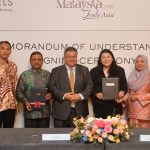Every October, World Arthritis Day and World Osteoporosis Day serve as important reminders of the need to care for our bones and joints. In Malaysia, the concern is especially pressing, as recent statistics indicate that nearly 40 percent of the population is affected by bone and joint problems. This growing issue is closely linked to the ageing of the population.
There is an old saying that “bones age before the person,” and it reflects a reality we cannot ignore. Bones are a complex structure made up of about 45 percent calcium carbonate and calcium phosphate, 36 percent collagen, 10 percent fat, 5 percent water, and a small percentage of other substances. Calcium, the most abundant mineral in the human body, plays a crucial role in maintaining bone strength, with 99 percent of it stored in the bones and teeth. However, as people grow older, bones gradually lose calcium. This decline is accelerated by reduced secretion of sex and growth hormones and a decrease in osteoblast activity, the cells responsible for forming new bone tissue. Over time, these changes lead to bone loss and fragility, increasing the risk of osteoporosis.
Osteoporosis has become a significant health concern in Malaysia. Recent studies show that 15.3 percent of the population is affected, and the figure rises sharply to 32.6 percent among individuals over the age of 71. This trend is especially alarming given Malaysia’s demographic shift. According to the Department of Statistics Malaysia, the proportion of citizens aged 65 and above is expected to grow from 8.1 percent in 2024 to 14.5 percent by 2040. Often called the “silent disease,” osteoporosis usually remains undetected until a fracture occurs. Ageing is a primary cause, but other contributing factors include gender, ethnicity, family history, and lifestyle habits.
Nutrition plays a central role in preventing osteoporosis. A balanced diet that includes calcium-rich foods such as dairy products, beans, and leafy greens can help strengthen bones. Adequate vitamin D intake is equally important, as it supports calcium absorption and bone density. Outdoor activities that expose the skin to sunlight help stimulate natural vitamin D production, while supplements can be considered if necessary. Unfortunately, the average calcium intake among Malaysian adults remains well below the recommended levels, at just 490.3 mg per day compared to the 1000 mg advised in the Recommended Nutrient Intakes (RNI) 2017. For women above the age of 50, the requirement increases to 1200 mg daily. Calcium supplements with added vitamin D are particularly beneficial for middle-aged and older adults, and taking them with a source of vitamin C, such as orange juice, may further enhance absorption.
While bone health is crucial, joint health also deserves attention. The human body has over 300 joints, located in areas such as the shoulders, hips, knees, wrists, and spine. These joints are composed of the articular surface, joint capsule, and joint cavity, all of which work together to enable smooth movement. Over time, cartilage degeneration, excessive strain, and other stressors can lead to arthritis, a condition marked by inflammation, pain, stiffness, and swelling. In Malaysia, osteoarthritis affects between 10 and 20 percent of adults and nearly 27 percent of older adults, making it the most common form of arthritis. Rheumatoid arthritis, another serious condition, also impacts around five in every 1,000 Malaysians.

Protecting the joints requires a multifaceted approach. A healthy diet with sufficient calcium, maintaining a proper body weight, and engaging in regular physical activity are all vital. Good posture during daily activities can prevent unnecessary strain, while avoiding prolonged exposure to cold and damp conditions may reduce discomfort. Nutritional supplements also play a supportive role. Among the most widely used are glucosamine, chondroitin sulphate, and methylsulfonylmethane, or MSM.
Glucosamine, naturally found in the body’s synovial fluid, is essential for forming cartilage and supporting joint flexibility. However, levels begin to decline after the age of 40, which weakens cartilage and reduces synovial fluid. Since it is difficult to obtain enough glucosamine from food, supplementation is often recommended. Chondroitin sulphate supports cartilage repair, stimulates new cartilage growth, and enhances joint lubrication, which helps reduce stiffness and friction. MSM, a natural sulphur compound, contributes to the formation of healthy cartilage and keratin. It is valued for its ability to relieve pain, reduce swelling, improve flexibility, and support circulation.
Today, many joint health supplements combine these three nutrients to provide comprehensive protection and comfort. With the growing prevalence of osteoporosis and arthritis in Malaysia, safeguarding bone and joint health is more important than ever. It requires more than just medical treatment; it involves making thoughtful choices about diet, lifestyle, and supplementation from a young age to ensure long-term mobility and independence.
In line with this growing awareness, Herbalife will soon introduce a new product traditionally used to relieve joint pain, offering Malaysians an additional option to maintain mobility and live life with greater ease. By taking proactive steps today, Malaysians can look forward to a healthier and more active tomorrow.









